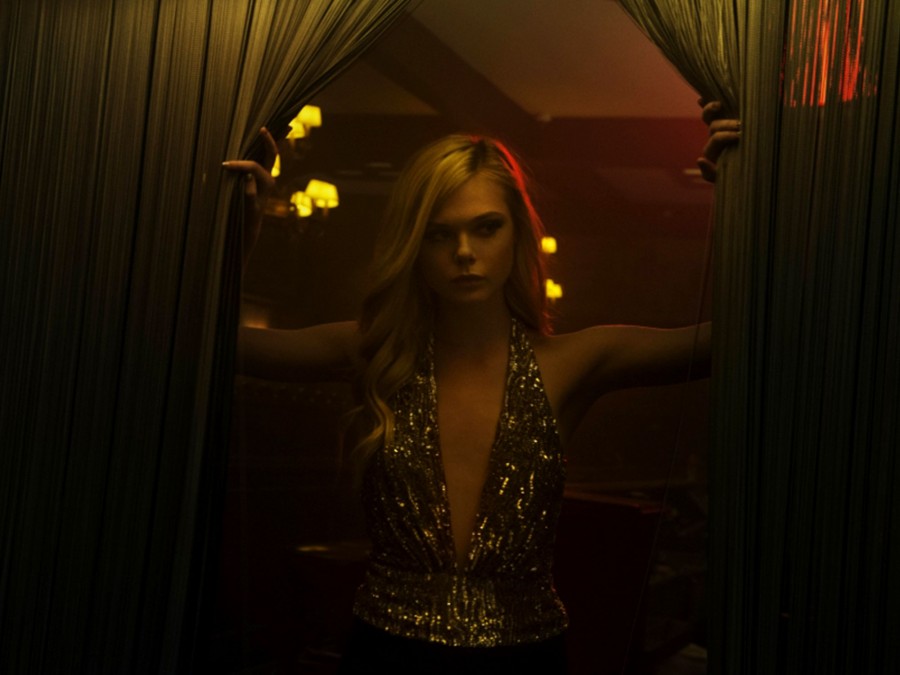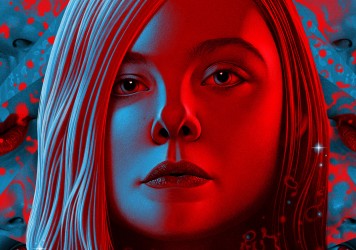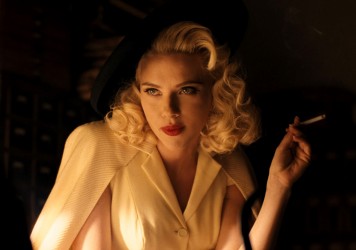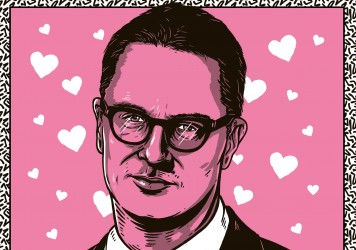Elle Fanning bares her soul in Nicolas Winding Refn’s beautiful dark twisted fantasy.
Consider the strange case of the “Blood Countess”, a 16th-century Hungarian noblewoman/serial killer who bathed in the blood of her victims – 650 servant girls – in the vain pursuit of eternal youth. Was she a witch? A vampire? Or simply a deranged soul with an insatiable lust for human flesh? Her extreme beauty regimen certainly captured the public imagination, most notably influencing the Brothers Grimm and Bram Stoker. But no. Like all good folk tales, the legend of Elizabeth Báthory de Ecsed has mutated over time, the details embellished and twisted and drained of nuance.
Apocryphal tales have long been a source of inspiration for writer/director Nicolas Winding Refn, Denmark’s very own Prince of Darkness. His last two films, 2011’s Drive and 2013’s Only God Forgives, were pulse-quickening neo-noirs that combined elements of fairy tale, fantasy and American pulp into heightened, hyper-stylised realities. Refn’s latest and best, The Neon Demon, is the culmination of his decades-long fascination with human nature in its darkest, most destructive form. It is – predictably, reliably – a gorgeous, grisly work which holds a (vanity) mirror up to modern society’s corroded moral core.
If you’ve glimpsed the trailer or any promotional materials, you’ll already be familiar with its striking opening shot: a young model laid out across an ornate sofa, its arched cornucopia-arms supporting her delicate, still head while exposing a deep cut running across her throat. Even before the camera pulls back to reveal that this fetishised scene is in fact part of an elaborately staged photo shoot, there is something curiously specious about it. You sit there scanning the blood- and glitter-flecked details, trying to discern their hidden meaning. Then it hits you.
The wicked die young. That’s not a tagline; it’s a mission statement. Of course, Refn isn’t one to peddle such hokey Old Testament wisdom. At least not before dissecting it slowly, surgically, in order to examine whether that wickedness is innate or whether it is symptomatic of corrupted innocence. Purity and physical perfection are dominant themes in The Neon Demon, yet despite being set in Los Angeles against the backdrop of the fashion world, this is not a pointed satire of any consumer or entertainment industry. Instead Refn has served up a scathing commentary on our image-obsessed culture, a feeling reinforced by the film’s most potent line: “Beauty isn’t everything… it’s the only thing.”
A picture of fresh-faced nubility, Jesse (Elle Fanning) arrives in Los Angeles a small-town girl with big dreams. She’s 16; wide-eyed and, as we soon learn, very dangerous. An opportune meeting with Christina Hendricks’ no-bullshit talent agent confirms what we already know: Jesse is going to be great. Fame beckons. All she needs now is the right kind of exposure – but it’s what she’s exposed to that seals her fate. Wherever she goes Jesse can’t help but be noticed. She meets a boy, Dean (Karl Glusman), who shows her the city and promises to keep things platonic when Jesse reveals that she is underage. Despite his honest intentions, Dean struggles to keep the wolf from the door. Others put up even weaker resistance.
On her first job Jesse is befriended by a make-up artist named Ruby (Jena Malone). Initially Ruby assumes the role of big sister, bringing Jesse into her clique while making a point to deflect the catty remarks and hazing tactics of models Gigi (Bella Heathcotte) and Sarah (Abbey Lee). Both have been around long enough to recognise what Jesse has, not to mention the threat she poses to their respective careers. “Who wants sour milk when you can get fresh meat?” observes Sarah. But more than anything, both girls are acutely aware of the fact that what makes Jesse special – the thing they most crave – is not skin-deep but something abstract and ephemeral. Something they will never have. Something they can never fully take from her. Not that it stops them trying.

As with Ryan Gosling’s schizophrenic wheelman in Drive, Jesse’s spiritual metamorphosis dovetails with a sharp tonal shift which plunges us into murkier, more explicitly violent waters. Sunset meet cutes give way to strobe-lit BDSM clubs. Big cats, lunar cycles and pink triangles play their part. A stomach-turning yet oddly sensual incident in a mortuary will likely rankle some viewers, especially given the offending character’s sexual orientation. (Incidentally, kudos to Cody Renee for what is surely the most committed demonstration of corpse acting ever captured on film.) Another particularly grim sequence features an act of scissors-based self-mutilation that would make Lars von Trier wince.
Is it simply the case that Refn can’t resist indulging his ego while administering shots of cheap titillation? It’s true he has a habit of deploying sexually-charged flash grenades that seem designed, first and foremost, to stun you into submission. It’s also true that he gets a kick out of eliciting precisely this reaction – say by having his protagonist beat another man to mulch in the close confines of an elevator, or another crawl into the open belly of his freshly disemboweled mother. But it would be remiss to reject The Neon Demon as a work of empty provocation. Because as you start to digest the visceral images streaming forth from Refn’s subconscious onto the screen, whether you’re aroused or repulsed (and these responses are by no means mutually exclusive), there’s never the sense that he is out purely to satisfy his own impulses.
It’s telling that this is the first ‘NWR film’ to be told primarily from a female perspective. Even more so that Refn pays tribute to his wife, Liv Corfixen, in the closing credits. That it was shot by a woman, Natasha Braier, and co-written by two more, Mary Laws and Polly Stenham, are key factors also. Consequently – crucially – this is not a film about the trials of womanhood refracted through a patriarchal prism. And yet, The Neon Demon is a more transparently personal film than perhaps we’ve come to expect from Refn, so much as it speaks directly to his innermost anxieties and existential tensions.
In our sensational interview with the director, he reveals that he always wanted to make a film about the 16-year-old girl inside of him. Well, he found the perfect alter ego in Elle Fanning. Given that she’s been acting since the age of three and previously impressed in JJ Abrams’ Super 8, Sofia Coppola’s Somewhere and Sally Potter’s Ginger & Rosa, the 18 year old can hardly be described as an unknown quantity at this point (in that sense Abbey Lee is the big find). It’s just that Fanning’s performance here is on a completely different level to anything she’s done before. It is a demanding role, one that requires real guile and guts, and to that end the freeness with which she casts off her bubbly, butter-wouldn’t-melt persona is pretty remarkable. Even when things turn seriously NSFW and Jesse’s vulnerability is exploited – specifically during a high-end shoot with an intimidating male photographer and later when confronted by Keanu Reeves’ predatory motel manager, Hank – she appears totally unfazed. Liberated, even.
If Fanning is the film’s lifeblood, then it’s Refn himself who provides its unerring emotional centre. Another available reading is that this is Refn’s poison valentine to Los Angeles: the place that once lured him with its bright artificial lights and perpetual sun, only to chew him up and spit him out following the commercial failure of his 2003 film Fear X; and, latterly, where he splits his time between his native Copenhagen. Los Angeles – and in Refn’s case Hollywood – subsists on its own mythology, and Refn exposes this by chipping away at the concealer-smothered cracks at the city’s surface. Russ Meyer’s Beyond the Valley of the Dolls and Dario Argento’s Suspiria are obvious touchstones. There are hat-tips to far weirder, more obscure exploitation fare, too. But The Neon Demon is always, unequivocally a Nicolas Winding Refn film. We wouldn’t have it any other way.
Published 19 May 2016
Time to meet the devil (again).
Fuck!
An intoxicating fever dream anchored by a transformative lead turn from Elle Fanning.

Elle Fanning sheds her squeaky clean image for Nicolas Winding Refn’s beautiful dark twisted fantasy.

New films from the Coen brothers, Andrea Arnold, Paul Verhoeven, plus loads more coming your way over the next 12 months.

With The Neon Demon the Danish writer/director has made his most provocative film yet. We travelled to Copenhagen to meet him.